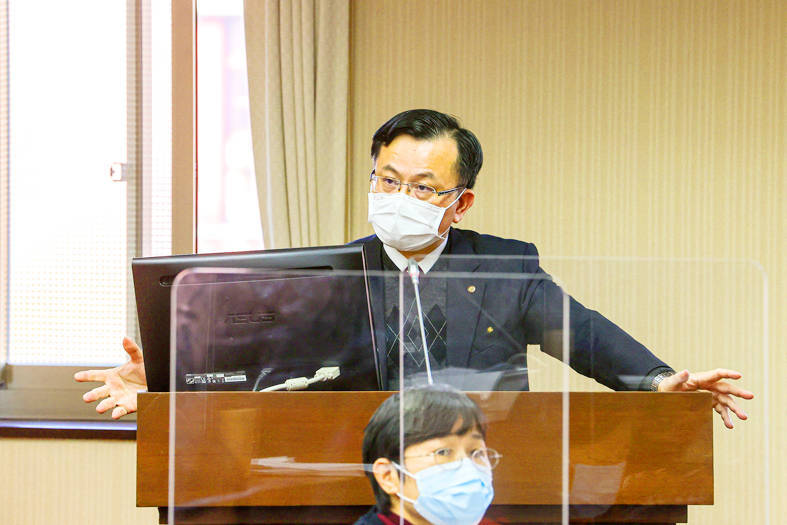《TAIPEI TIMES》 NCC bill aims to protect Internet users, list rules for major online platforms

National Communications Commission Chairman Chen Yaw-shyang participates in a question-and-answer session at the Legislative Yuan in Taipei yesterday. Photo: CNA
By Shelley Shan / Staff reporter
The draft digital communications act would protect Internet users and clearly list the obligations required of Facebook, Dcard and other large online platform operators, the National Communications Commission (NCC) said yesterday.
NCC commissioners yesterday approved the legal framework of the draft act at their weekly meeting after having deliberated over it for about eight months, NCC Vice Chairman and spokesman Wong Po-tsung (翁柏宗) said.
The Legislative Yuan on Tuesday passed an amendment to the National Communications Commission Organization Act (國家通訊傳播委員會組織法), which would authorize the agency to stipulate the nation’s Internet policy and rating system for online content. The commission would also be in charge of overseeing and managing communications networks, including online platforms.
“The draft act is to be unveiled before the Lunar New Year holiday,” Wong said. “We will also host three information sessions to explain the details to the public.”
The commission aims to deliver the final draft to the Executive Yuan by June or July for approval, he added.
The draft act would have 11 chapters, four of which are obligations to be imposed on providers of intermediary services, hosting services or online platform services, said Evelyn Liu (劉佳琪), head of the NCC’s planning division.
Intermediary service providers refer to Internet service providers, caching service providers and domain name registrars, whereas hosting service providers include Google Drive, Dropbox and other cloud storage service providers, as well as Web hosting service providers, Liu said.
Commissioners divided online platform operators into online platform service providers and designated online platform service providers, Liu said, adding that YouTube, Meta (Facebook), Yahoo and Dcard are examples of online platform service providers.
“Designated online platform service operators are those with a strong market influence, and commissioners have yet to determine which platforms qualify to be in this category,” she said.
In the EU, very large online platforms refer to those with more than 45 million users in Europe, and they are given specific obligations due to the particular risks they pose regarding the dissemination of illegal and harmful content, Liu said.
While service providers are subject to different rules of accountability based on their market influence, the draft act places relatively more responsibilities on online platform operators, she said.
“Online platform service providers would be asked to regularly produce transparency reports, offer relief systems, disclose information of online sellers, present guidelines for the handling of complaints from users and ensure that the platform would not be abused,” Liu said.
“For designated platform operators, they have to conduct independent auditing and risk assessment and management, in addition to obligations placed on online platform operators,” she said.
Users must be notified and told why their comments are taken down, while platform operators must list comments that they have removed on a database so that cases could be scrutinized by the public, she said, adding that users need to have ways to dispute claims.
As for tackling problems caused by disinformation, the Institute of Watch Internet Network (iWIN) would still be tasked with accepting consumer complaints about online content and relaying them to the administrative agencies in charge, she said.
If the content contravenes the Protection of Children and Youths Welfare and Rights Act (兒童及少年福利與權益保障法), which is enforced by the Ministry of Health and Welfare, the ministry can ask iWIN to seek a court order to remove the content from platforms, Liu said.
新聞來源:TAIPEI TIMES



















